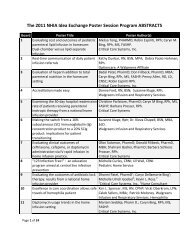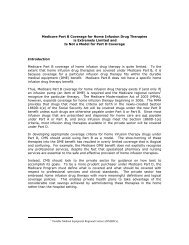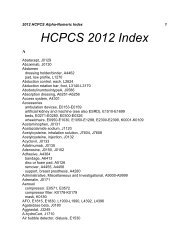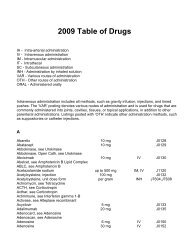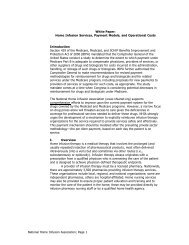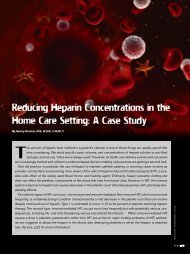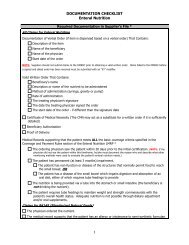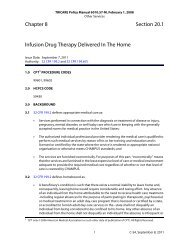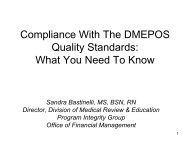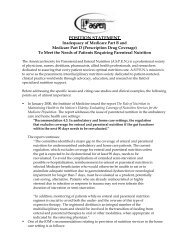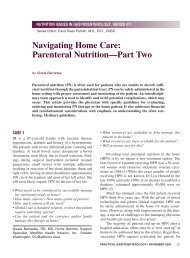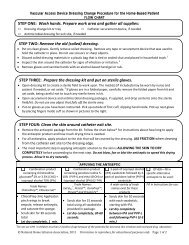Table 12 c<strong>on</strong>tinuedEnrollment<strong>State</strong>10/1/10Massachusetts 16,321(3/1/2011)Payment ApproachM<strong>on</strong>thly capitati<strong>on</strong>.Minnesota 49,174 Capitati<strong>on</strong> for health carewith add-<strong>on</strong> capitati<strong>on</strong> fornursing facility and homeand community-basedenrollees.Scope of servicesSenior <strong>Care</strong> Opti<strong>on</strong>s covers all <strong>Medicaid</strong> andMedicare benefits including primary, acute,pharmacy, behavioral health, community andfacility-based services and supports and carecoordinati<strong>on</strong>.Integrated health and l<strong>on</strong>g-term care products forseniors include 180 days nursing facility liabilityfor community-based enrollees and home andcommunity-based services for community-basedseniors. Integrati<strong>on</strong> with Medicare SNPs is anopti<strong>on</strong> through Minnesota Senior Health Opti<strong>on</strong>s.New Mexico 38,000 Global capitati<strong>on</strong>. Instituti<strong>on</strong>al and HCBS services.New York 28,909 <strong>Medicaid</strong> Advantage Plus(MAP) fully integratesMedicare and <strong>Medicaid</strong>capitati<strong>on</strong> and services.Partial cap plans receivem<strong>on</strong>thly <strong>Medicaid</strong> capitati<strong>on</strong>to cover benefit package;other services are fee-forservice.MAP integrates Medicare Advantage, Medicarecopayments, and a majority of traditi<strong>on</strong>al<strong>Medicaid</strong> services including l<strong>on</strong>g term care.Partial cap plans cover traditi<strong>on</strong>al HCBS services,custodial nursing home, DME, and ancillaryservices such as dental, podiatry and audiology.Tennessee 28,793(1/1/11)Blended capitati<strong>on</strong> paymentencompassing all <strong>Medicaid</strong>reimbursedl<strong>on</strong>g term careservices (nursing facility andHCBS) as well as physical andbehavioral health services.Physical and behavioral health services, nursingfacility, and HCBS including pers<strong>on</strong>al care visits,attendant care, homemaker, home-deliveredmeals, Pers<strong>on</strong>al Emergency Resp<strong>on</strong>se System,respite (in-home and inpatient), adult day care,assistive technology, minor home modificati<strong>on</strong>s,pest c<strong>on</strong>trol, and community-based residentialalternatives (assisted living, adult care homes andcompani<strong>on</strong> care).Texas 170,025 Capitated premium. Home and community-based services.Washingt<strong>on</strong> 4,231(3/2011)Full risk capitati<strong>on</strong> - permember/per m<strong>on</strong>th.The Washingt<strong>on</strong> <strong>Medicaid</strong> Integrati<strong>on</strong> Partnershipis a fully integrated managed care program with<strong>on</strong>e MCO in <strong>on</strong>e county. Benefits include l<strong>on</strong>gtermcare (HCBS and instituti<strong>on</strong>al), mental health,chemical dependency and medical care. <strong>State</strong>psychiatric hospitals are carved out as is inpatientresidential chemical dependency treatment.Wisc<strong>on</strong>sin 34,598 Capitati<strong>on</strong>. <str<strong>on</strong>g>Family</str<strong>on</strong>g> <strong>Care</strong> provides HCBS and instituti<strong>on</strong>alservices to frail elders and people withdisabilities. The <str<strong>on</strong>g>Family</str<strong>on</strong>g> <strong>Care</strong> Partnership Programadds medical care (primary and acute) to the l<strong>on</strong>gterm care services provided in <str<strong>on</strong>g>Family</str<strong>on</strong>g> <strong>Care</strong>.<strong>State</strong>s identified a number of challenges associated with operating n<strong>on</strong>-PACE MLTC programs. <strong>State</strong>shighlighted a wide range of operati<strong>on</strong>al issues, including: c<strong>on</strong>tracting with Medicare Advantage SpecialNeeds Plans (SNP); coordinati<strong>on</strong> with physical health MCOs; challenges associated with slow enrollmentgrowth; limited staff and administrative resources to accommodate expansi<strong>on</strong>; plan difficultyc<strong>on</strong>tracting with Boarding Homes; added regulati<strong>on</strong>s when l<strong>on</strong>g-term care is administered by MCOs44 00
(e.g., need to credential Adult <str<strong>on</strong>g>Family</str<strong>on</strong>g> Homes and Boarding Homes); lack of support from Area Agencies<strong>on</strong> Aging (AAAs); and difficulty c<strong>on</strong>tacting beneficiaries for potential enrollment.<strong>Medicaid</strong> managed care initiatives for dual eligiblesTwenty-five states reported enrollment of dual eligibles in (n<strong>on</strong>-PACE) <strong>Medicaid</strong> managed carearrangements, <strong>on</strong> either a voluntary or mandatory basis. Nearly nine milli<strong>on</strong> <strong>Medicaid</strong> beneficiaries aredual eligibles – low-income seniors and younger pers<strong>on</strong>s with disabilities who are enrolled in bothMedicare and <strong>Medicaid</strong>. Dual eligibles are am<strong>on</strong>g the sickest and poorest Medicare beneficiaries, andthey account for almost 40 percent of total <strong>Medicaid</strong> spending although they comprise just 15 percentof <strong>Medicaid</strong> enrollees. <strong>State</strong> policymakers are eager to find ways to better c<strong>on</strong>trol costs and improvecare for this populati<strong>on</strong>, including through managed care approaches that integrate medical and, insome cases, l<strong>on</strong>g-term services, and also through models that integrate <strong>Medicaid</strong> and Medicare servicedelivery and payment.Overall, 25 states reported enrollment of dual eligibles in n<strong>on</strong>-PACE <strong>Medicaid</strong> managed carearrangements, <strong>on</strong> either a voluntary or mandatory basis. In some of the 25 states, dual eligibles areenrolled in comprehensive managed care – MCOs or PCCM programs; in other states, dual eligibles areenrolled in n<strong>on</strong>-comprehensive PHPs for specific categories of service, such as mental health care orl<strong>on</strong>g-term services and supports, but remain in fee-for-service or in other managed care arrangementsfor all other <strong>Medicaid</strong>-covered services. Table 13 summarizes <strong>Medicaid</strong> managed care enrollmentarrangements for dual eligibles in the 25 states.<strong>State</strong>Ariz<strong>on</strong>aCaliforniaColoradoDCFloridaGeorgiaHawaiiIdahoIowaTable 13: <strong>Medicaid</strong> <strong>Managed</strong> <strong>Care</strong> Enrollment Arrangements for Dual Eligibles (n<strong>on</strong>-PACE)Descripti<strong>on</strong> of ArrangementDual eligibles must enroll in the ALTCS (l<strong>on</strong>g-term care managed care program). All ALTCS MCOs inMaricopa County must be a Medicare Advantage Plan or a Medicare Advantage SNP.Enrollment of dual eligibles is mandatory in County-Organized Health Systems. Voluntaryenrollment in Two-Plan and Geographic <strong>Managed</strong> <strong>Care</strong> counties under the following rules: 1) Medi-Cal beneficiary must be enrolled in a Medi-Cal MCO; 2) the Medicare Advantage/Special NeedsPlan (MA/SNP) that the beneficiary chooses must be the Medi-Cal MCO in which the member iscurrently enrolled or its plan partner in the county; 3) the member will be disenrolled from theMedi-Cal MCO and placed into fee-for-service if the beneficiary chooses a MA/SNP that is notassociated with the Medi-Cal MCO.Dual eligibles may voluntarily enroll in Denver Health (MCO), the Colorado Regi<strong>on</strong>al Integrated<strong>Care</strong> Collaborative (EPCCM), and Rocky Mountain Health <strong>Care</strong> (PHP).Dual eligibles are enrolled in the n<strong>on</strong>-emergency transportati<strong>on</strong> PHP <strong>on</strong> a mandatory basis.Dual eligibles may voluntarily enroll in MCOs (including the Nursing Home Diversi<strong>on</strong> Programplans) unless otherwise excluded.Dual eligibles may voluntarily participate in the Service Opti<strong>on</strong>s Using Resources in a CommunityEnvir<strong>on</strong>ment (SOURCE) – an enhanced PCCM program serving certain frail elderly and disabledbeneficiaries to improve the health outcomes of pers<strong>on</strong>s with chr<strong>on</strong>ic health c<strong>on</strong>diti<strong>on</strong>s by linkingprimary medical care with home and community-based services. The program builds <strong>on</strong> the state’sPCCM program, Georgia Better Health <strong>Care</strong> Program (GBHC).Dual eligibles are enrolled in QExA (QUEST Expanded Access) <strong>on</strong> a mandatory basis.Dual eligibles may voluntarily enroll in the Medicare <strong>Medicaid</strong> Coordinated Plans (n<strong>on</strong>comprehensivePHPs) offered through Blue Cross and United Healthcare.Dual eligibles enroll in the state’s behavioral health PHP.c<strong>on</strong>tinued45
- Page 1 and 2: kaisercommission onmedicaidand theu
- Page 3 and 4: kaisercommission onmedicaidand theu
- Page 5 and 6: Table of ContentsExecutive Summary
- Page 7 and 8: EXECUTIVE SUMMARYMedicaid, the publ
- Page 9 and 10: party enrollment brokers to provide
- Page 11 and 12: HEDIS©, CAHPS©, and state-specifi
- Page 13: ConclusionFor over 30 years, state
- Page 16 and 17: from the recession and the slow rec
- Page 18 and 19: A note on Medicaid managed care ter
- Page 20 and 21: Managed caremodelTable 1: Medicaid
- Page 23 and 24: States are increasingly mandating m
- Page 25 and 26: States with Medicaid MCOsKey Sectio
- Page 27 and 28: States have “auto-assignment” a
- Page 29 and 30: excess of a specified threshold for
- Page 31 and 32: Dental care and outpatient and inpa
- Page 33 and 34: the second trimester, and within th
- Page 35 and 36: eported that they limit PCP panel s
- Page 37 and 38: States with non-comprehensive PHPsK
- Page 39 and 40: Measuring, monitoring, and improvin
- Page 41 and 42: seven states required 10 measures o
- Page 43 and 44: CAHPS© surveys. North Carolina is
- Page 45 and 46: Special initiatives to improve qual
- Page 47 and 48: public health efforts to reduce dis
- Page 49: Medicaid managed long-term care and
- Page 53 and 54: In many states, broader efforts foc
- Page 55 and 56: Looking ahead: Medicaid managed car
- Page 57 and 58: ConclusionFor over 30 years, state
- Page 59 and 60: APPENDIX 2: Summary of Medicaid Man
- Page 61 and 62: Program Name(e.g., Popular Name, 19
- Page 63 and 64: APPENDIX 3: MCO Contracts, Plan Cha
- Page 65 and 66: State(No. ofcontracts)NameEnrollmen
- Page 67 and 68: State(No. ofcontracts)NameEnrollmen
- Page 69 and 70: APPENDIX 5: MCO Capitation Rate-Set
- Page 71 and 72: APPENDIX 7: MCO Network Adequacy Re
- Page 73 and 74: State Primary Care Obstetric Care S
- Page 75 and 76: APPENDIX 9: Providers Recognized as
- Page 77 and 78: APPENDIX 11: PCCM Administrative Se
- Page 79 and 80: APPENDIX 13: Initiatives to Improve
- Page 81 and 82: I. MANAGED CARE OVERVIEW1. Total Ma
- Page 83 and 84: 4. Enrollment Requirements.a. We ar
- Page 85 and 86: ii. Please indicate whether the fac
- Page 87 and 88: c. Required Providers: We are inter
- Page 89 and 90: IV. NON-COMPREHENSIVE PREPAID HEALT
- Page 91 and 92: . Does your state use CAHPS© surve
- Page 93 and 94: VI. SPECIAL INITIATIVESAll states s
- Page 95 and 96: Appendix I: Managed Care Contracts1
- Page 97: Appendix II: Clinical Quality Perfo
- Page 100:
1330 G S T R E E T NW, W A S H I N



